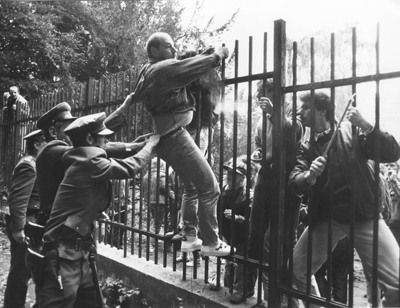One week ago, on Tuesday morning, Germanwings flight 4U9525 crashed into a mountain in the French alps. 150 people were killed. All of us in Germany were thrown into a state of shock and couldn’t believe this had happened. The German President cut short his state visit to South America, Chancellor Merkel cancelled all of that day’s appointments and rushed to the site of the accident. People were aghast and wanted to know: why? A very short time later, the French State Prosecutor, in Marseille, announced that, almost certainly, the plane’s co-pilot had deliberately downed the plane, killing 149 passengers and crew along with him. This is known, among psychiatrists, as „extended suicide“.
This event might, in my opinion, cause much bigger harm than may at first appear. True, a mass killing of so many people is something very hard to digest. It certainly doesn’t happen all the time and even if it does happen, when a ship like the „Titanic“ sinks or a train derails, causing a similar amount of lives lost, this can almost always be attributed to „technical defects“ or a „natural disaster“. To many, if a tragedy of this magnitude was deliberately caused by a single person, even a member of a highly respected profession like a pilot, things are much harder to shoulder.
The CEO of Lufthansa, Germanwings‘ parent company, publicly appeared many times in recent days. Usually, if you are the boss of a company, and one of your employees commits a grave mistake, the company and you yourself are held responsible. Legally, this seems to be the case here, too. Lufthansa made generous contributions to relatives of the victims, paying even more than they are obliged to do by law. However, CEO Carsten Spohr refused to even start considering stepping down from his job, which would imply that he might be at least in part responsible for what happened. The German public generally agreed with his statements, and he was even praised for the way he behaved in the aftermath of the catastrophe, consoling relatives of the victims, but at the same time, pointing out that this was a singular event that could not have been foreseen by anyone.
To me, this was very difficult to understand. Surely, when something like this happens, it is only natural to start looking for faults in Lufthansa’s training, faults in Lufthansa’s treatment of pilots, faults in the very system that was set up to provide air traffic in Germany. However, none of this happened. True, some improvements were suggested, like requiring a flight attendant to be present in the cockpit at all times in future, so when the pilot goes off to the bathroom, the co-pilot isn’t left on his own. If at all, Mr Spohr was criticized for not agreeing to this change of procedure quickly enough. But apart from that, not very many critics were heard. While personally, I found it difficult to experience Carsten Spohr’s total lack of self-reflection in the aftermath of the incident, this was not generally regarded so in Germany.
Which leads me to ask, why are things the way they are? The answer might be: Airlines always have been, and in Germany still are, seen as a symbol of the country. When Germanwings fails, Germany fails. Therefore, we cannot let anyone criticize Germanwings‘, or Lufthansa’s, leadership.
Germany has been struggling hard for the past few decades. We have the legacy of the Nazis and the Second World War to live with, we have to bear the brunt of criticism regarding the handling of the Euro currency crisis, and yes, we are still trying hard to find our place in the world, our national „self confidence“.
Last year, the German national football team won the Football World Cup. We didn’t only beat Brazil 7:1 on their home turf, and generally were regarded as having been the right team to have won. We were also widely praised for having done so with a team of different cultural backgrounds. Naturalized Germans with parents from Africa or Eastern Europe. The German national team are, therefore, widely seen as an example of cultural diversity and a spearhead in the fight against racism.
For the past few years, we have seen an increasing number of immigrants coming to Germany, and although there have been some right-wing protests in recent months, immigrants and asylum seakers are generally well-received in the German society.
And also, while we are quite sick and tired of Greece and other southern countries perhaps „breaking the rules“ of the Euro club, we are generally quite kind to our southern European neighbours, and willing to put up with the mess the Euro has caused.
All this, however, is, in my opinion, largely a superficial change that is not yet well-rooted in German society. The basic, German mood still remains, and Andreas Lubitz‘ act of killing 149 airline passengers in a case of extended suicide brings this to the surface, once more.
We are, deep down in our hearts, still largely a nationalistic, chauvinist society, afraid of foreigners and critical of anyone who is even slightly different. We don’t like rule-breakers. Unlike most of our European neighbours, we frown upon people who walk across the street, ignoring a red traffic light. We look down on people who spend more money than they earn, thus running a risk of enduring personal bankruptcy. And we certainly despise people who might be even slightly mentally ill, if they start behaving like ordinary people, for example, wanting to become a pilot at a national airline.












